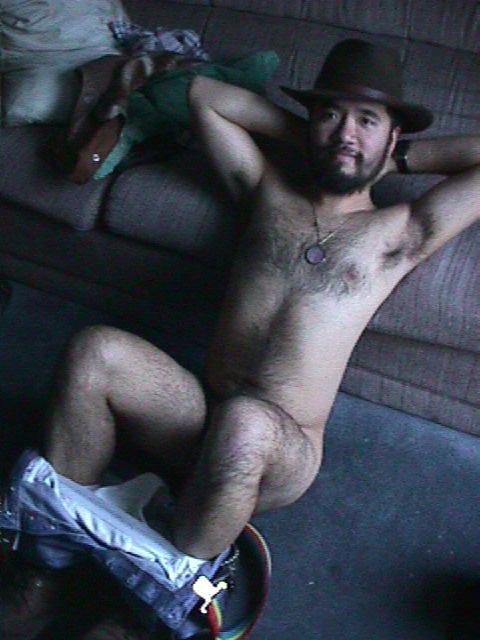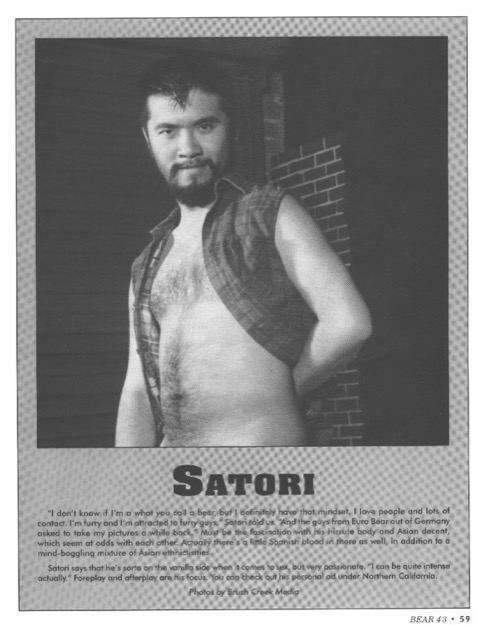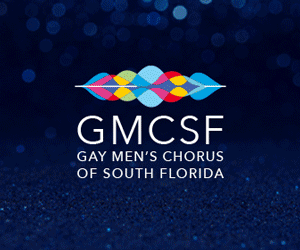
Bear Tracks: Coming Out in the Soc.Motss Era: Satori Agape
Launched in 1979, in the earliest days of the internet, Usenet was the first nongovernmental platform-agnostic computer communication network. Several BBS’s (bulletin board services) were created. Created in 1987 soc.motss (“members of the same sex”) is the earliest documented LGB-specific online community. Satori Agape explored the cyberworld. Someone he met on a non-gay BBS invited him to join the Sacramento BBS and because that friend knew the BBS administers, he was granted privilege to join. Here he found Acropolis, then Parthenon and Doryphorous. Because he was just turning 18, he had to ask special permission to gain access. He was given a questionnaire. He vividly recalls being asked if he knew what Greek (anal sex) and French (oral sex) were. He told them it had to do with what language gay men spoke. (No doubt, this endeared him to them.)
Born in Manila, Philippines, in 1971 (he was 6) his family moved to Sacramento, CA, where he lived starting in 1976. He came out in 1989 when he turned 18. He reports he had an aversion to gays growing up because they were always depicted as “very effeminate.” He describes himself as introverted and shy, making it difficult for him to meet people, but found it safe to come out online. He had no problem interreacting on BBSs because the environment provided him a chance to interact in a way that didn’t seem threatening to him. Even today, he reports, he finds it much easier to begin by chatting and writing to a new acquaintance before talking to them in person.


He started going to gay bars where he saw masculine gay men. Soon after that he came across BEAR magazine. He then attended his first IBR (International Bear Rendezvous), where he made many connections. He joined the Sacramento Valley Bears, where he became an unofficial greeter. With them he went to Lazy Bear at the Russian River. Eventually he drifted away from the club because he wasn’t connecting with anyone.
He was attracted to bears because they are hairy, furry, and have facial hair. He found them cuddly and snuggly. He reports he was considered “in the ‘Rice’ group or a “panda bear.” Bears attracted to Asian men are attracted to them because they are smooth-skinned. “I considered myself a mutant or an ‘albino’ among the bears (Asian and furry). Eventually I embraced myself.” He is of Asian Indian, Chinese, Filipino, Japanese, Pacific Islander, and Spanish descent, according to Ancedstry.com and 23 and Me. He found most bears were only interested in other bears (hairy and bearded).
On a dare Satori went to BEAR magazine to pose. “They said they’d pencil me in. Then I said I’m hairy and lifted my shirt.” The photographer was immediately called in and Satori was shot the same day. “Richard [Bulger] was fantastic. I spent time with him at his cabin and kind of dated him a little bit.” Satori also appeared in Euro Bear and Chiron Rising. Founded in the late 1980s by Pat Colley, Swan was the first magazine for older gay men and their admirers. A few years later he renamed it Chiron Rising.


After being drawn to and getting to know bears based on their masculine physical attributes and cuddly nature, he later learned that what he prized most was “what I found inside a person–their inner beauty.” He reports he connects better with men who are caring, loving, kind, compassionate, genuine, intelligent, experienced in life, have a tenderness, gentleness, a love of life, a commitment to growing, and are intelligent.
Satori’s understanding of and embrace of these values was part of what led him to change his name to Satori Agape. The name both personified him based on what he inspires in others and what he aspires to himself. This name serves both as a representation of who he is and what he brings out in others, “Satori” being of a higher mind (enlightenment) and “Agape” being of Higher emotion (ultimate love). “Satori” is a concept in Zen Buddhism and means “the state of sudden indescribable intuitive enlightenment.”
Love is defined as an emotional attachment that differs in meaning depending on whether the relationship is between family, friends, lovers, a hobby, or a deity. According to ancient literature, there are said to be seven stages of love: attraction, infatuation, love, reverence, worship, obsession and death. The highest level of intimacy requires the greatest amount of trust in a relationship. It is only when a person feels truly safe with somebody that we become willing to share the deepest core of who we are. It’s up close and personal. For many men intimacy involves an exclusive emotional and physical bond, marked by an open communication, vulnerability, and trust. It’s a safe space to access admiration and affection.
Satori was introduced in BEAR magazine and is forever enshrined there:

“I don’t know if I’m a what you call a bear, but | definitely have that mindset. I love people and lots of contact. I’m furry and I’m attracted to furry guys. * Satori told [BEAR magazine]. “And the guys from Euro Bear out of Germany asked to take my pictures a while back.” It must be the fascination with his hirsute body and Asian descent, which seem at odds with each other. Actually, there’s a little Spanish blood in there as well, in addition to a mind-boggling mixture of Asian ethnicities.” Satori says that he’s sorta on the vanilla side when it comes to sex, but very passionate. “I can be quite intense actually.” Foreplay and after play are his focus. You can check out his personal ad under Northern California.
As of 2024, Satori is still living with his husband in Phoenix, AZ. Sorry bears, he’s taken.












